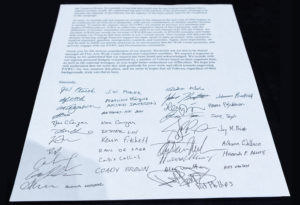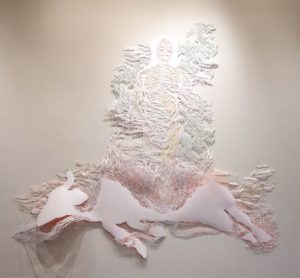PROVINCETOWN — The current crop of Fine Arts Work Center fellows expressed their displeasure at their $750 monthly stipend in a letter now on display at the annual FAWC exhibit at the Provincetown Art Association and Museum (PAAM).
“Even in the first three months of our residency, many of us have struggled or been unable to: pay medical bills, visit ailing family members; travel off the Cape as needed; make car payments; repair automobiles; attend important art openings, readings, or conferences (at which we ourselves are featured),” the letter reads. “The stipend simply does not meet the current needs of the cost of living in Provincetown, and while FAWC’s motto — Creativity Thrives Here — is a worthy goal, we are not, in fact, currently able to thrive here.”

The letter requested a $500 monthly increase.
The two-page letter, signed by the 20 fellowship winners, did not sit well with museum as it prepared for the FAWC show. The exhibit opened a week late while negotiations on how to handle the situation played out.
Though the parties reached an agreement, which included increasing the stipend to $1,000, the dispute exposed a disconnect between artists and the institutions that both support and depend on them.
“I’ve been told my tone is not appropriate, when I’m truly honored to be here,” said Antonius-Tin Bui, who decided to put the protest letter in the exhibit in place of the cut-paper piece he had created. “A lot of people may perceive us as being rebellious or ungrateful. But in a way we are doing our job.”
FAWC, founded in 1968, gives free room and studio space as a well as a stipend to 20 emerging artists for seven months each winter. It’s a prestigious program, attracting 1,700 applications for the 20 spots. Former fellows have gone on to earn national reputations, seven Pulitzer prizes, and nearly 50 Guggenheim awards.

Bui, 27, a performance artist who also works with cut paper, said it felt like an obvious choice to show the letter, which the fellows wrote collaboratively.
“I think it’s important to expand the definition of art,” Bui said. “I view the letter as activism, or art-ivism.”
The artists submitted the letter to the FAWC trustees on Dec. 16. The day before the show at PAAM was to open, Bui elected to remove the cut-paper piece framed on the wall and show only the letter.
When PAAM Executive Director Chris McCarthy saw the exhibit, she refused to allow it to open.
“The original artwork was removed from the exhibition unbeknownst to anyone at PAAM and replaced with the letter which presented an imbalanced and incomplete exhibition,” McCarthy told the Independent by email. “PAAM reserves the right to ensure that all of the exhibitions that are presented in our galleries are up to our standards, which resulted in our inability to present the exhibition in its entirety.”
Achieving curatorial balance is not censorship, McCarthy said.
“We in no way censored the exhibition,” she told the Independent.
But emails going back and forth between PAAM and FAWC administrators, which the fellows saw, indicated McCarthy was uncomfortable with the content of the letter.
On the morning of Jan. 17, McCarthy emailed FAWC Visual Coordinator Lydia Hicks, stating, “The inclusion of the letter brought a very serious FAWC issue into PAAM and I find it very difficult to have words that negatively impact the organization with whom we are collaborating included in the exhibition, but I am willing to let that go with the understanding that the original piece is installed.”
Bui said at first McCarthy gave them an ultimatum: either the letter comes down or the show won’t open. After a week, PAAM and the fellows agreed to show both Bui’s piece and the letter.
“I received censorship and pushback and it was very discouraging,” Bui said.
Akiko Jackson, a work center poetry fellow from Hawaii, said all the fellows considered it censorship, and that they did not feel supported by FAWC’s administrative staff.
Joy Priest, 31, a work center poetry fellow from Kentucky, said that FAWC seems to encourage art as activism until it’s turned on them.
Richard MacMillan, FAWC co-executive director, disagreed. During the week the PAAM show was delayed, the board of trustees finalized a stipend increase of $250 per month, plus a new $1,000 exit stipend to help fellows when they leave.
“We really appreciate this clarion call from these fellows,” MacMillan said.
The board knew the stipend was due for an update, he said. That is why they had two priorities for this year, he said — solar panels to lower FAWC’s carbon footprint, and an increase in the stipend.
The last raise occurred in 2011, MacMillan said.
“Our fellows are invited guests on our campus and we don’t want them to feel they’re not listened to,” he said.
The trustees received letters from four fellows thanking them for the increase, MacMillan added.
“We are grateful,” Priest said. “But you can hold gratitude and be critical at the same time.”
This is happening all over the country, said Francisco Marquez, a poetry fellow from Venezuela.
“I see a lot of artists like us speaking up to people in power,” Marquez said. “A lot of this isn’t surprising. It does suck, but an organization will never be perfect.”



